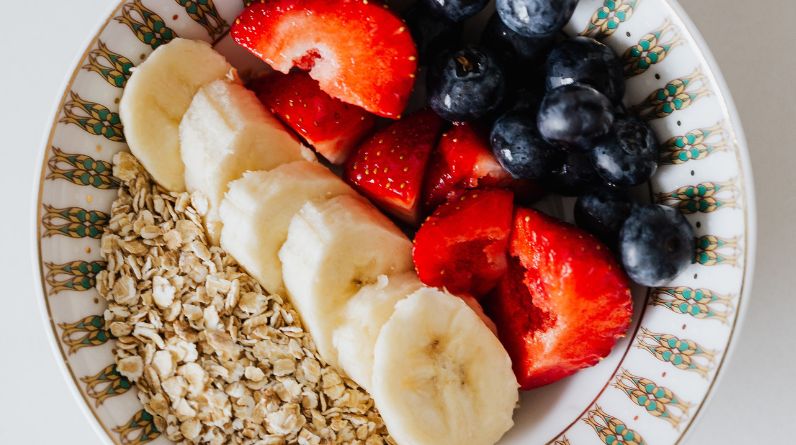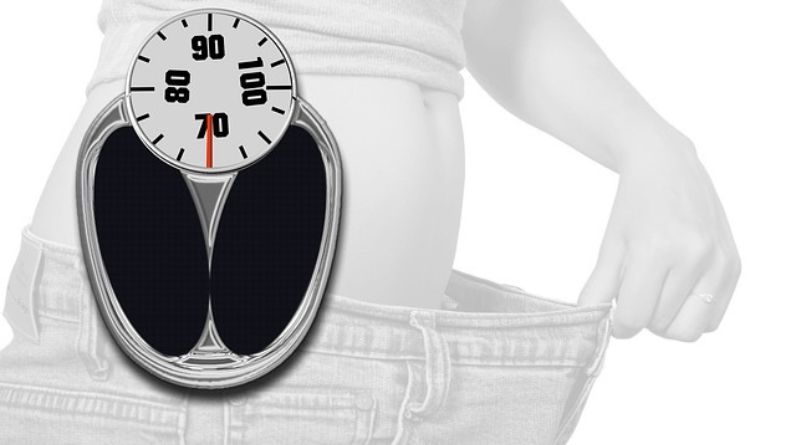
Fiber is a powerhouse nutrient often associated with digestive health, but its benefits extend far beyond just keeping your digestive system regular. When it comes to weight loss, fiber plays a crucial role in supporting your efforts to shed those extra pounds and achieve a healthier body. In this comprehensive guide, we will explore the various ways in which fiber can aid in weight loss, the types of fiber-rich foods you should incorporate into your diet, and how to make the most of this nutrient to achieve your weight loss goals.
1. Introduction to Fiber and Weight Loss
Fiber, a type of carbohydrate found in plant-based foods, is unique in that it’s not fully digested by the body. Instead, it largely avoids digestion and provides a multitude of health benefits. One of its most notable advantages is its ability to aid in weight loss. Let’s delve into how fiber contributes to weight management.
2. The Mechanisms Behind Fiber’s Weight Loss Benefits
2.1 Enhanced Satiety and Reduced Calorie Intake:
High-fiber foods possess a remarkable ability to create a sense of fullness and satisfaction that lingers long after a meal. When you consume fiber-rich foods, they expand in your stomach and intestines, filling up space and triggering stretch receptors that signal your brain that you’re satiated. This enhanced feeling of fullness naturally curbs your appetite and reduces the likelihood of overeating or frequent snacking between meals. Additionally, the act of chewing high-fiber foods requires more time, giving your body the opportunity to recognize that it’s no longer hungry. As a result, you’re more likely to consume fewer calories overall, which is a fundamental aspect of weight loss.
2.2 Slower Digestion and Blood Sugar Regulation:
Fiber’s ability to slow down the digestive process is a key contributor to its weight loss benefits. When you consume fiber, it creates a physical barrier around nutrients, particularly carbohydrates, slowing their breakdown and absorption in the digestive tract. This gradual release of nutrients into the bloodstream prevents rapid spikes in blood sugar levels, which can trigger insulin surges and subsequent crashes that leave you craving sugary or high-calorie foods. By maintaining stable blood sugar levels, fiber helps control your appetite and reduces the likelihood of sudden and intense hunger pangs, thus supporting your weight loss efforts.
2.3 Reduced Calorie Absorption:
Certain types of fiber, particularly soluble fiber, exhibit an interesting property known as binding. This means that as soluble fiber moves through your digestive system, it has the ability to bind to dietary fat and other nutrients. This binding action forms complexes that are too large to be fully absorbed by the body. As a result, a portion of the ingested dietary fat may pass through your system without contributing to calorie absorption. While this effect isn’t significant enough to justify indulging in high-fat foods, it does add to the cumulative impact of fiber in promoting a calorie deficit, which is essential for weight loss.
3. Types of Fiber and Their Weight Loss Benefits
3.1 Soluble Fiber: A Gel-Like Guardian of Fullness:
Soluble fiber, found abundantly in foods like oats, beans, lentils, and certain fruits, possesses a unique ability to transform into a gel-like substance when it comes into contact with water. This transformation occurs in your digestive tract, where soluble fiber binds with water to create a viscous, gelatinous material. As this gel travels through your gastrointestinal system, it slows down the movement of food and nutrients, leading to a gradual release of sugars into the bloodstream. This slow and steady nutrient release prevents sudden spikes in blood sugar levels, helping to maintain stable energy levels and control cravings. Furthermore, the gel-like texture of soluble fiber contributes to a prolonged feeling of fullness, making it an excellent ally in your weight loss journey.
3.2 Insoluble Fiber: Nature’s Broom for Digestive Health:
While soluble fiber often steals the spotlight, insoluble fiber is equally vital, particularly for digestive health. Found primarily in vegetables, whole grains, and nuts, insoluble fiber adds bulk to stool and aids in its movement through the digestive tract. This mechanism helps prevent constipation and promotes regular bowel movements, a crucial factor in maintaining a healthy gut. By ensuring that waste material is efficiently eliminated from your body, insoluble fiber supports a clean and well-functioning digestive system. While its direct role in weight loss might be less pronounced than that of soluble fiber, a healthy digestive system is a cornerstone of overall well-being, which in turn can positively influence your weight loss efforts.
4. Incorporating Fiber into Your Diet for Weight Loss
4.1 Focus on Whole Plant Foods:
Embrace the abundance of nature’s fiber-rich offerings by centering your diet around whole plant foods. Fruits, vegetables, whole grains, legumes, and nuts are not only excellent sources of fiber but also provide an array of essential vitamins, minerals, antioxidants, and phytochemicals that contribute to your overall well-being. These foods are not only nutrient-dense but also contribute to a feeling of fullness, making them valuable allies in your weight loss journey. Fill your plate with colorful salads, hearty bean stews, whole grain bowls, and nutty snacks to amplify your fiber intake while delighting your taste buds with a diverse range of flavors and textures.
4.2 Gradual Increase:
Embarking on a fiber-rich diet is a journey that requires a gentle pace. Sudden, dramatic increases in fiber intake can lead to digestive discomfort, including bloating, gas, and cramping. To avoid these unwelcome side effects, gradually increase your fiber intake over the course of several weeks. This gradual approach gives your digestive system time to adapt and establish a harmonious relationship with the increased fiber load. Additionally, incorporating a variety of fiber sources is essential to ensure that you’re reaping the benefits of both soluble and insoluble fiber. This diversity not only supports digestive health but also maximizes the weight loss potential of fiber.
4.3 Hydration:
Hydration is an unsung hero in the fiber saga. As fiber absorbs water and swells in your digestive tract, adequate hydration is crucial to ensure that it moves smoothly through your system. Water acts as a lubricant, facilitating the passage of fiber and waste materials, preventing potential blockages and discomfort. Aim to drink plenty of water throughout the day, especially if you’re increasing your fiber intake. This practice not only enhances the digestive effects of fiber but also contributes to your overall well-being.
5. Common Mistakes to Avoid
5.1 Relying Solely on Supplements:
While fiber supplements can provide a convenient way to boost your fiber intake, they should not be your primary source of this essential nutrient. Whole foods offer a holistic package of nutrients, including vitamins, minerals, antioxidants, and phytochemicals, which work synergistically to support your health. Whole foods also provide a more satiating and satisfying eating experience, contributing to your overall enjoyment of meals. Reserve fiber supplements for situations where whole food sources are unavailable or impractical, and prioritize the bountiful offerings of nature’s pantry for your daily fiber needs.
5.2 Ignoring Hydration:
As fiber absorbs water, it’s crucial to maintain adequate hydration when increasing your fiber intake. Neglecting hydration can lead to digestive discomfort and potentially exacerbate the very symptoms you’re seeking to alleviate through increased fiber consumption. Make a conscious effort to drink water throughout the day, ensuring that your body has the necessary fluids to support the smooth movement of fiber through your digestive tract. Hydration complements the benefits of fiber, contributing to a harmonious and well-functioning digestive system that supports your weight loss goals.
6. Conclusion
In conclusion, the incorporation of fiber-rich foods into your diet can be a game-changer for weight loss. By understanding the mechanisms behind fiber’s benefits, choosing the right types of fiber, and making gradual dietary adjustments, you can harness the power of fiber to support your weight loss journey and achieve a healthier lifestyle. Remember that while fiber plays a crucial role, a holistic approach involving a balanced diet, regular physical activity, and overall lifestyle adjustments is key to achieving lasting weight loss success.
Frequently Asked Questions
1. Can fiber help with weight loss?
Absolutely, fiber can be a valuable ally in your weight loss journey. One of its primary weight loss mechanisms is its ability to promote satiety and fullness. High-fiber foods tend to have a more substantial volume and take longer to chew, triggering signals of fullness that can lead to reduced calorie intake. Moreover, fiber-rich foods require more chewing, allowing your body more time to signal to your brain that you’re satisfied, which can curb overeating.
Fiber also plays a crucial role in stabilizing blood sugar levels. When you consume foods rich in soluble fiber, such as oats or legumes, they form a viscous gel in your digestive tract that slows down the absorption of sugar. This steadier release of sugar into your bloodstream prevents rapid spikes and crashes in blood sugar levels, reducing the likelihood of energy slumps and subsequent cravings for sugary, calorie-dense foods.
Furthermore, certain types of fiber, like viscous soluble fiber, have the remarkable ability to bind to dietary fats and prevent their absorption. This means that some of the calories from the fats you consume may be excreted rather than absorbed, contributing to a reduction in overall calorie intake.
2. How much fiber should I consume daily for weight loss?
For weight loss and overall health, the recommended daily intake of fiber is around 25 grams for women and 38 grams for men. However, it’s important to note that individual needs can vary based on factors such as age, activity level, and overall health. Gradually increasing your fiber intake to meet these recommendations can have a positive impact on your weight loss efforts.
3. Can I lose weight by only increasing my fiber intake?
While increasing your fiber intake can be a beneficial strategy for weight loss, it is just one piece of the puzzle. A holistic approach that includes a well-balanced diet, regular physical activity, proper hydration, and sufficient sleep is essential for sustainable weight loss. Fiber contributes to weight loss by promoting fullness, stabilizing blood sugar, and reducing calorie absorption, but it works best when combined with other healthy lifestyle habits.
4. Are all fiber-rich foods low in calories?
Not all fiber-rich foods are low in calories. While many high-fiber foods, such as fruits, vegetables, and whole grains, are relatively low in calories, there are exceptions. Foods like nuts, seeds, and avocados are also rich in fiber but contain higher calorie counts due to their healthy fat content. While these foods offer numerous health benefits, portion control is important when consuming them as part of a weight loss plan.
5. Can I get enough fiber on a low-carb diet?
While low-carb diets prioritize minimizing carbohydrate intake, it’s still possible to incorporate fiber-rich foods. Non-starchy vegetables like broccoli, spinach, kale, and cauliflower are excellent sources of fiber and can be included in a low-carb eating plan. Additionally, certain nuts and seeds, such as chia seeds, flaxseeds, and almonds, are relatively low in carbohydrates while providing a substantial amount of fiber. Balancing your carbohydrate intake with these fiber-rich options can support your weight loss goals while adhering to a low-carb approach.
6. Can fiber cause digestive discomfort?
While fiber offers numerous health benefits, increasing your fiber intake too quickly can indeed lead to digestive discomfort, including gas, bloating, and abdominal discomfort. This is particularly true if your digestive system is not accustomed to a high-fiber diet. To prevent these issues, it’s recommended to gradually introduce fiber-rich foods into your diet, allowing your gut microbiota and digestive system time to adapt. Start by incorporating small portions of fiber-rich foods and gradually increasing your intake over a few days or weeks. Drinking plenty of water can also help soften the fiber and facilitate its movement through the digestive tract, reducing the risk of discomfort.
7. Is soluble or insoluble fiber better for weight loss?
Both soluble and insoluble fibers offer unique benefits that can contribute to weight loss. Soluble fiber, found in foods like oats, beans, and fruits, forms a gel-like substance when it comes into contact with water. This gel slows down digestion and helps create a sensation of fullness, which can aid in reducing calorie intake. Additionally, soluble fiber can help stabilize blood sugar levels by slowing the absorption of sugars from the digestive tract, preventing energy crashes and subsequent cravings.
On the other hand, insoluble fiber, abundant in vegetables, whole grains, and nuts, adds bulk to stool and supports regular bowel movements. While it may not directly impact weight loss, its role in maintaining digestive health and preventing constipation is essential for overall well-being. Both types of fiber can be beneficial for weight loss, and incorporating a variety of fiber-rich foods into your diet is recommended.
8. Are there any risks to consuming too much fiber?
While fiber is an essential component of a healthy diet, consuming excessive amounts can lead to potential risks. Overconsumption of fiber, especially when introduced too rapidly, can result in digestive discomfort, including gas, bloating, and diarrhea. Additionally, very high fiber intake can interfere with the absorption of certain minerals, such as calcium, iron, magnesium, and zinc. This could potentially lead to nutrient malabsorption over time. Therefore, it’s important to strike a balance and gradually increase your fiber intake in a sustainable manner, allowing your body to adapt.
9. Do fiber supplements work for weight loss?
Fiber supplements can be a convenient way to increase your fiber intake, especially if it’s challenging to consume enough fiber through whole foods alone. They can contribute to a feeling of fullness, which may support weight loss efforts by reducing overall calorie intake. However, it’s important to note that whole foods provide additional nutrients, such as vitamins, minerals, and antioxidants, that are not present in fiber supplements. Therefore, while fiber supplements can be a helpful tool, they are not a substitute for a well-rounded and nutrient-dense diet.
10. Can fiber help prevent weight regain after weight loss?
Fiber’s role in weight maintenance after weight loss is primarily attributed to its ability to promote satiety and stabilize blood sugar levels. By creating a sense of fullness and slowing down the absorption of sugars, fiber can contribute to better appetite control and reduced cravings, which are crucial factors in preventing weight regain. Additionally, fiber-rich foods are often nutrient-dense and can help you feel more satisfied with your meals. Incorporating a variety of fiber sources into your diet as part of a balanced eating plan can support your efforts to maintain a healthy weight after losing it.





